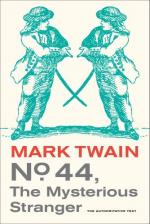Chapter 5
On the fourth day comes the astrologer from his crumbling old tower up the valley, where he had heard the news, I reckon. He had a private talk with us, and we told him what we could, for we were mightily in dread of him. He sat there studying and studying awhile to himself; then he asked:
“How many ducats did you say?”
“Eleven hundred and seven, sir.”
Then he said, as if he were talking to himself: “It is ver-y singular. Yes... very strange. A curious coincidence.” Then he began to ask questions, and went over the whole ground from the beginning, we answering. By and by he said: “Eleven hundred and six ducats. It is a large sum.”
“Seven,” said Seppi, correcting him.
“Oh, seven, was it? Of course a ducat more or less isn’t of consequence, but you said eleven hundred and six before.”
It would not have been safe for us to say he was mistaken, but we knew he was. Nikolaus said, “We ask pardon for the mistake, but we meant to say seven.”
“Oh, it is no matter, lad; it was merely that I noticed the discrepancy. It is several days, and you cannot be expected to remember precisely. One is apt to be inexact when there is no particular circumstance to impress the count upon the memory.”
“But there was one, sir,” said Seppi, eagerly.
“What was it, my son?” asked the astrologer, indifferently.
“First, we all counted the piles of coin, each in turn, and all made it the same—eleven hundred and six. But I had slipped one out, for fun, when the count began, and now I slipped it back and said, ’I think there is a mistake—there are eleven hundred and seven; let us count again.’ We did, and of course I was right. They were astonished; then I told how it came about.”
The astrologer asked us if this was so, and we said it was.
“That settles it,” he said. “I know the thief now. Lads, the money was stolen.”




